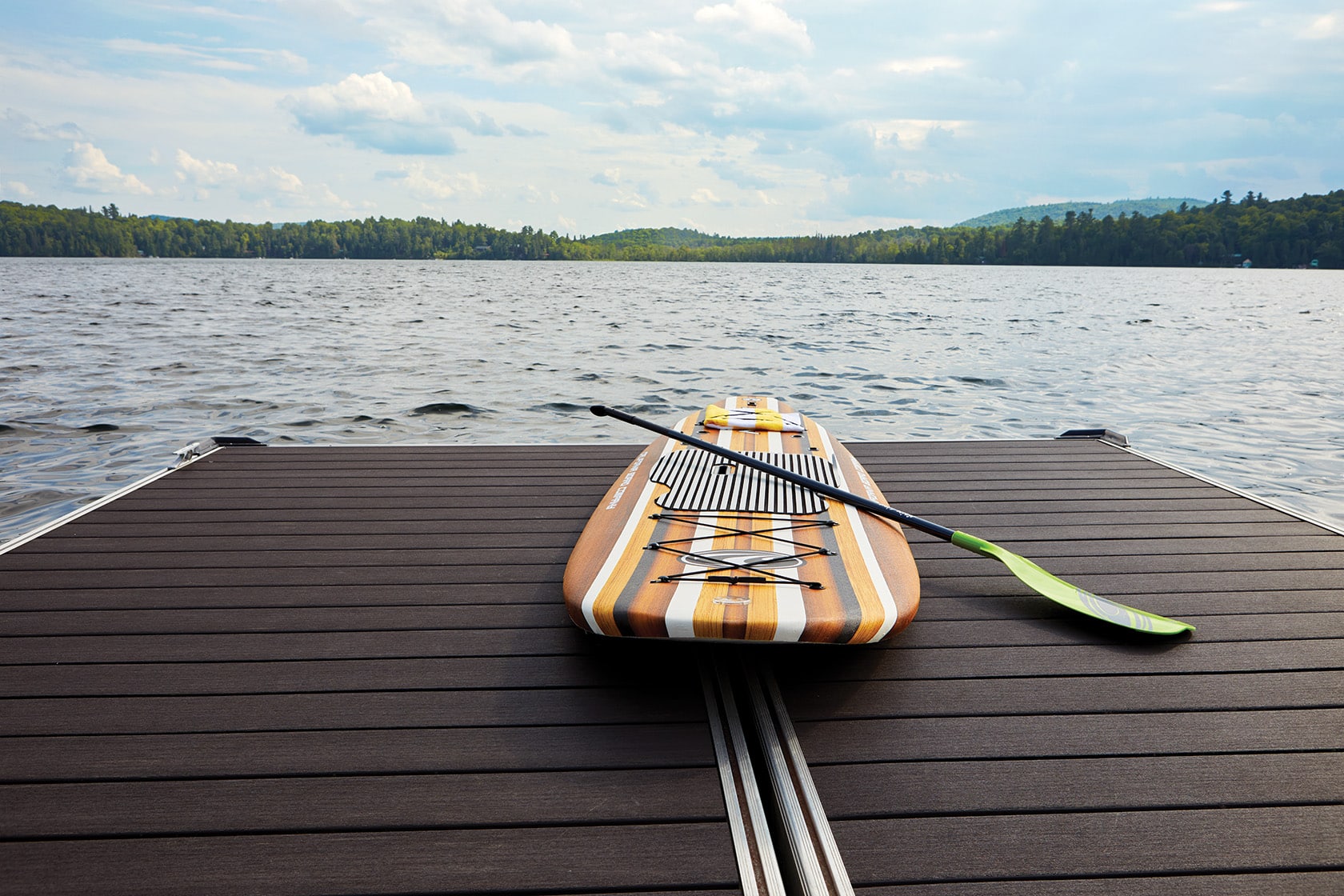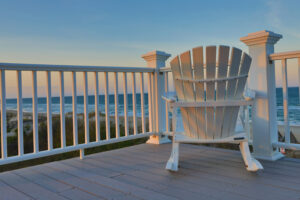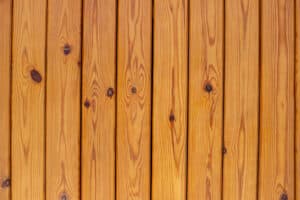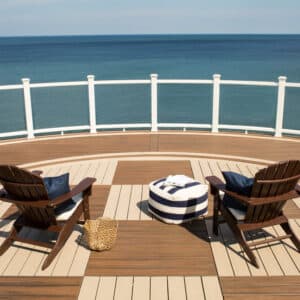
Which Deck Boards Are Best for Saltwater Environments?
Saltwater is sneaky. It not only causes wear and tear by crashing against your dock, but it also hangs in the air, settles on your fasteners, and seeps into your boards. If you’re building coastal decking projects near the ocean (or even near a saltwater pool), you need decking that won’t warp, rot, or crumble under salt exposure. That means choosing the right materials and understanding how saltwater affects everything from your boards to your screws.
You’ll need seaside decking materials that handle salt water and UV rays well. Let’s walk through how saltwater affects deck boards and which decking materials actually hold up.
Saltwater: The Silent Deck Killer
Building an outdoor space is more than waves crashing over your dock. Salt air lingers. It settles into fasteners, seeps into fibers, and slowly breaks down finishes. Over time, salt residue and exposure can:
- Rust standard metal fasteners
- Discolor and degrade wood
- Weaken paint, stains, and sealants
- Encourage mold, mildew, and decay
That’s why saltwater-ready materials—like marine-grade fasteners and moisture-resistant decking—are essential.
Which Decking Materials Handle Salt Best?
Here’s the honest truth: some materials simply aren’t made for the coast, like traditional timber decking. Here’s our shortlist of real-world winners that combine beauty with weather-resistant materials for your outdoor space.

Composite Decking Boards
If you want the look of wood with long-lasting performance, composite materials are your best friend. Made from wood fibers and plastic, composite boards like Trex, Fiberon, and TimberTech are specifically engineered to resist the moisture, mold, and UV damage of coastal seawater. And they do it well!
How composite performs:
- Doesn’t rot or swell.
- Holds color and is fade-resistant despite constant exposure to direct sunlight.
- Won’t splinter.
- Doesn’t need much more than a rinse.
- Holds up well under heavy foot traffic.
Additionally, composite decking is often made from recycled wood and plastic, keeping waste out of landfills and reducing the need for virgin timber. Brands like Trex and Fiberon are known for using reclaimed materials without sacrificing strength.
Homeowners and contractors who want low-maintenance performance with the aesthetic appeal of a traditional wood look will appreciate what composite decking offers as a choice for their coastal outdoor spaces..

Pressure-Treated Wood
There are several valid reasons for the popularity of pressure-treated lumber, including its affordability and widespread availability nationwide. It’s treated to resist fungus, wood-boring bugs, and rot. Pressure-treated deck boards do need routine care to avoid any warping, cracking, and rotting if not properly maintained and to keep it looking its best for as long as possible.
At Decks & Docks, we carry Southern Yellow Pine treated for marine use, a sustainable and dense variety known for its exceptional longevity in harsh conditions with saltwater.

PVC Decking
This is the top-tier, low-maintenance solution for saltwater resistance. PVC is entirely synthetic, made from recycled plastic—no wood rotting, no water absorption. Just smooth, solid, impervious boards. It’s perfect for waterfront homes, piers, docks, boardwalks, and marinas that need zero-fuss decking in harsh weather conditions.
Advantages of PVC deck boards:
- Salt can’t touch it.
- It won’t mold, warp, or crack in high humidity.
- Even after years of exposure to salt air, PVC decks still retain their fresh appearance with strong structural integrity.
PVC decking offers longevity that minimizes waste over time. Its extended lifespan means fewer replacements and less material thrown away.
Aluminum Decking
Want something nearly indestructible that fights saltwater corrosion? Aluminum’s your answer. It’s strong, lightweight, and completely waterproof, making it ideal for building heavy-duty docks or commercial structures where durability is paramount. It doesn’t rust, warp, or fade. Many options feature textured finishes for enhanced slip resistance and to prevent moisture buildup. While it’s not as common to find a deck completely made of aluminum, it’s often used for commercial sites, dock ramps, and deck railings.
Products like ThruFlow’s grated aluminum decking systems take it a step further by promoting airflow and drainage, helping to prevent rot and moisture-related damage to the substructure. These are especially effective in high-exposure areas and are often chosen for marinas, ramps, and flood-prone builds.
Plus, aluminum decking is 100% recyclable and frequently made with recycled content. It can be reused or repurposed even after decades of service.
Not All Fasteners Are Created Equal: Understanding Salt Corrosion Ratings
Choosing the right fasteners and hardware means knowing how different metals handle salt exposure. If you’re not using marine-grade hardware, salt air will eat your deck from the inside out.
Corrosion resistance has different ratings, and it’s helpful to familiarize yourself with a few key terms so you know what to look for.
316 Stainless Steel
This is the gold standard for seawater environments. It contains molybdenum, which dramatically improves resistance to chlorides (like salt). If your deck is near saltwater, this is your safest bet. It resists pitting and rust longer than any other stainless grade commonly used in decking.
304 Stainless Steel
This grade of steel is decent in mild conditions, but without molybdenum, it breaks down much faster in marine environments. It’s fine for inland projects, but not an ideal choice for coastal homes and building projects.
Galvanized Steel
It may look tough, but its zinc coating wears off over time. Once that coating is breached, rust spreads fast. It’s not really a long-term option for salt-heavy air.
Marine-Grade Aluminum
Aluminum fares well when it’s powder-coated or anodized. The coating keeps corrosion at bay and extends lifespan.
Overall, look for 316 stainless steel fasteners, the gold standard for corrosion resistance. Avoid 304 stainless or galvanized if you’re near saltwater; as mentioned, they just won’t last. And choose powder-coated aluminum fasteners when matched with aluminum boards.
One more thing: never mix metals. That’s a recipe for galvanic corrosion. Always check the rating before buying, and when in doubt, ask your Decks & Docks expert!
Budgeting Upfront Cost vs. Long-Term Value
It’s tempting to go with the cheapest board. But in salty air, you get what you pay for.
PVC and aluminum cost more upfront, but they last 30–40 years with barely any upkeep. Composite offers great value too; it’s easy to maintain and built for the elements. And treated wood? Sure, it’s cheaper at the register, but it’s expensive in terms of labor, repairs, and replacement.
Think long-term. A deck that lasts 30 years with minimal maintenance isn’t just a better investment, it’s peace of mind and long-lasting enjoyment.
Ready to Launch Your Coastal Deck Project?
At Decks & Docks, we specialize in materials that perform under salt, sun, and storms. Whether you’re building a family dock, a seaside patio, or a pier that takes a beating, we’ve got what you need, and we’ll help you get it done right. We stock the best marine construction materials, and back them with expert advice. Whether you’re a contractor, marina, or waterfront homeowner, we’ll help you pick the right deck for your environment.
Need help choosing the right materials? Contact us or visit a Decks & Docks location near you.
Your deck. Your dock. Done right!
- About the Author
- Latest Posts
Dan has worked for Decks and Docks for over twenty-five years. He managed the original Decks and Docks store in St. Pete, which is our largest store. Dan is simply the best all around. He knows more about this company and our products than probably anyone else. Dan currently works in Sales at our corporate office.
